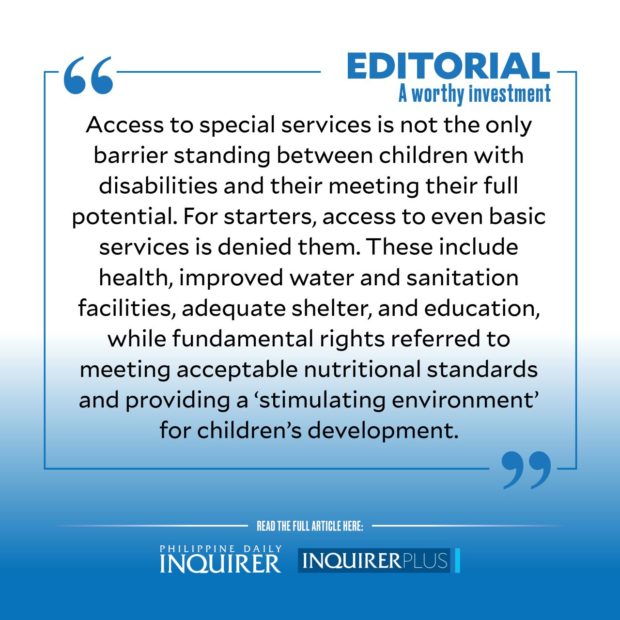A worthy investment
By most estimates, 15 percent of the world’s population—at least one billion people—have some form of disability, and, according to the United Nations Children’s Fund (Unicef), nearly 240 million of them are children.
While in some countries, families raising children with disabilities receive special assistance from government, be it in the form of cash subsidies or actual services, sadly in the Philippines, such a responsibility often falls on the parents and other relatives with little or hardly any form of support offered to them.
This is borne out in a recent study that found that Filipino families raising children with disabilities spend 40 to 80 percent more than other families, resulting in poverty rates “that are 50 percent or higher” compared to other households.
The study was conducted by the Department of Social Welfare and Development (DSWD) and Unicef with funding from the Australian government. Entitled “Cost of Raising Children with Disabilities in the Philippines,” the report didn’t just track the difficult road that families with children with disabilities need to traverse; it also made recommendations to address the problems it had identified. The study is considered “a unique survey globally,” as the researchers said they were “not aware of a similar national survey focusing on children with disabilities in such detail and comprehensiveness.”
Children’s disabilities make extraordinary demands on their families, with households with a disability card spending almost three times more of their household budgets than other households. Included in these expenses are fees for consultations and therapies, medicines and other assistive equipment (such as crutches and wheelchairs), followed by transportation and education.
Cited in the report is a family which had to spend P500 in transportation fare for each of the five times they consulted an optometrist. Another family ended up picking a local clinic instead of a hospital for treatment because the clinic was nearer and more accessible.
“Travel to metropolitan areas was essential to access some services or medications,” said the report. “One family said they would travel three hours and spend P2,000 on fuel to obtain Tacrolimus, a drug to prevent organ rejection following their child’s transplant.”
Other families sought to ease the burden of transportation by staying with relatives in Metro Manila, though even this entails added expenses. Other families resorted to traveling to the capital daily, including one parent who needed to have the child’s hemoglobin level monitored regularly.
Indeed, the DSWD-Unicef study bears out the finding that children with disabilities are one of the most marginalized and excluded groups in society. They face daily discrimination in the form of negative attitudes, lack of adequate policies and legislation. Nongovernment organization Humanium stated that because they live in a disabling environment, “they are effectively barred from realizing their rights to health care, education, and even survival.”
Access to special services is not the only barrier standing between children with disabilities and their meeting their full potential. For starters, access to even basic services is denied them. These include health, improved water and sanitation facilities, adequate shelter, and education, while fundamental rights referred to meeting acceptable nutritional standards and providing a “stimulating environment” for children’s development.
Among the study’s findings was that children with a disability card and their families were systematically disadvantaged, while the group which is most disadvantaged was made up of “children with functional limitations” without a disability card.
Fortunately, officials and policymakers seem to be aware of the situation. Social Welfare Secretary Erwin Tulfo emphasized in a public forum that while the DSWD had been conducting interventions to help these families, more needed to be done.
Unicef Philippines representative Oyunsaikhan Dendevnorov called on the government, development partners, and civil society to ensure that public policy would work for children with disabilities and that their voices would be heard in the drafting of legislation.
Among the policy recommendations in the study was the improvement of the Department of Health’s database and the development of multiple entry and referral system for early detection.
The report also recommended the creation of a “disability allowance” with a flat amount of P1,000 to P2,000 for all children with a disability card to cover the extra cost of living.
After all, every centavo “invested” in improving the development of children with disabilities has the potential to multiply the rewards not just for their families but for society in the future.

















